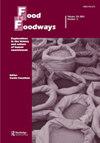日常生活中的传统饮食:来自纽约市拉美裔加勒比社区的观点
IF 1.1
Q2 ANTHROPOLOGY
引用次数: 2
摘要
摘要:我们利用关键信息者访谈来调查纽约市西班牙裔加勒比(HC)社区成员(多米尼克人、古巴人和波多黎各人,n = 23)。虽然这两种美食有很多相似之处,但采访显示,对TD的评价存在差异。古巴人强调TD的不健康,而多米尼克人和波多黎各人则强调TD在日常生活中的重要性。参与者确定了TDs的不健康方面(碳水化合物和油炸食品占主导地位,缺乏新鲜水果和蔬菜),并讨论了饮食变化的动机(移民、新劳动习惯的需求、健康问题和配偶/家庭影响)。分析表明,与TDs相关的独特思想、符号和含义反映了这些社区与其遗产国的关系,这是由于不同的移民历史和全球力量塑造了散居海外和加勒比地区的美食和社会。本文章由计算机程序翻译,如有差异,请以英文原文为准。
Traditional diets in everyday life: Perspectives from Hispanic Caribbean communities in New York City
Abstract We utilized key informant interviews to examine traditional diet (TD) perceptions among members of the Hispanic Caribbean (HC) community in New York City (Dominicans, Cubans and Puerto Ricans, n = 23). While the cuisines share many similarities, the interviews revealed differences in how the TDs were evaluated. Cubans emphasized the unhealthiness of their TD, while Dominicans and Puerto Ricans emphasized the importance of their TD in daily life. Participants identified unhealthy aspects of their TDs (predominance of carbohydrates and fried foods, and the lack of fresh fruits and vegetables), and discussed motivations for dietary changes (migration, the demands of new labor routines, health concerns, and spouse/family influence). The analysis demonstrates that distinct ideas, symbols, and meanings associated with TDs reflect how these communities relate to their heritage countries, as a result of distinct migration histories and global forces shaping cuisines and societies in the diaspora and the Caribbean.
求助全文
通过发布文献求助,成功后即可免费获取论文全文。
去求助
来源期刊

Food and Foodways
ANTHROPOLOGY-
CiteScore
2.20
自引率
0.00%
发文量
16
期刊介绍:
Food and Foodways is a refereed, interdisciplinary, and international journal devoted to publishing original scholarly articles on the history and culture of human nourishment. By reflecting on the role food plays in human relations, this unique journal explores the powerful but often subtle ways in which food has shaped, and shapes, our lives socially, economically, politically, mentally, nutritionally, and morally. Because food is a pervasive social phenomenon, it cannot be approached by any one discipline. We encourage articles that engage dialogue, debate, and exchange across disciplines.
 求助内容:
求助内容: 应助结果提醒方式:
应助结果提醒方式:


